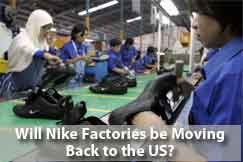The Growing Use of Vendor Drop Shipments
While ship from store is often touted as a primary way retailers can support e-commerce fulfillment, drop shipments from suppliers directly to customers are gaining more attention.
RSR Research's new report, "Profitable Customer Engagement: The Unmet Promise," exploring Omnichannel order fulfillment strategies found a "new willingness" by many retailers to consider drop shipping directly from vendors.
Supply Chain Digest Says... |
 |
| Of course, managing vendor drop shipment performance requires new performance management strategies, metrics, detection rules (such as late shipments), and vendor communications. |
 |
|
|
"This has evolved over the past three years," the RSR report says. "Previously unwilling to entrust delivery (and customer address information) to their merchandise vendors and logistics providers, retailers have become far more pragmatic: within three years we expect to see parity among all retailers, with approximately 75% taking advantage of their suppliers' systems."
An RSR study from January likewise found that retail priorities had shifted more in favor of drop shipments due to "the need for speed, and perhaps even renewed interest in the e-commerce channel."
Beyond speed, the advantages for retailers of drop shipments include less upfront costs to purchase and warehouse inventories. A much wider offering of items can also be offered beyond those a retailer normally keeps in stock.
"Retailers can offer a wider range of products on-line without ever needing to personally handle the inventory," wrote Jett McCandless of Project44, a retail IT services firm. "And they only purchase items directly from the distributer or manufacturer as their customers buy them."
Visit the Retail Vendor Performance Management home page to learn more
and subscribe to the monthly newsletter.
Not surprisingly, most of the challenges relate to not owning that inventory. A lack of visibility into supplier inventory challenges the ability to provide customers with accurate ship dates, delivery timeframes and shipment tracking. Out-of-stock risks rise with less visibility, along with vendors addressing other retail partner needs. Retailers also risk hurting their reputation since they're not in control of the delivery process.
RSR's January report also found that retailers appear to be over-estimating vendors' capabilities to manage inventories. Wrote RSR, "Without visibility into inventory levels, this is nothing short of fantasy."
Of course, managing vendor drop shipment performance requires new performance management strategies, metrics, detection rules (such as late shipments), and vendor communications. More tricky: monitoring vendor performance from the consumer's perspective when the order is shipped directly by the supplier.
Target Dumps Leading Textile Supplier
Target stores has decided to cut ties with Indian textiles manufacturer Welspun India because of fake Egyptian cotton sheets supplied by the Mumbai-headquartered company.
 On Aug.19, Target said that between 2014 and 2016, Welspun India supplied sheets saying they were made of Egyptian cotton, although they were not. On Aug.19, Target said that between 2014 and 2016, Welspun India supplied sheets saying they were made of Egyptian cotton, although they were not.
"After an extensive investigation, we recently confirmed that Welspun substituted another type of non-Egyptian cotton when producing these sheets between August 2014 and July 2016," Target said in a statement.
Target is contacting customers and offering a refund to those who bought these sheets, it said. The retailer has also removed the product - sold under the Fieldcrest label - from its stores.
"We have informed Welspun that, due to this conduct, we are in the process of terminating our relationship with them," Target added.
Some 750,000 such products were impacted over the two-year span, said Molly Snyder, a Target spokesperson.
Welspun India is one of the world's largest textile makers and typically caters to the US, UK and European markets. Target is Welspun India's second largest customer, behind American retailer Bed, Bath and Beyond. J. C. Penney, Macy's, Costco, Home Depot and Walmart also buy from Welspun India.
Nike Says It Can Manufacture in the US
 The sportswear giant has teamed with financial firm Apollo Global Management in an unusual arrangement to improve Nike's supply chain in the Americas. The partnership is designed to build domestic manufacturing infrastructure (most Nike products are currently made in Southeast Asia) and help Nike get products to customers quicker, including a planned increase in customized merchandise. The sportswear giant has teamed with financial firm Apollo Global Management in an unusual arrangement to improve Nike's supply chain in the Americas. The partnership is designed to build domestic manufacturing infrastructure (most Nike products are currently made in Southeast Asia) and help Nike get products to customers quicker, including a planned increase in customized merchandise.
Terms of the partnership weren't disclosed. Nike has $32.4 billion in annual revenue. Apollo is a private equity firm with $186 billion in assets under management.
"We are excited to be working with Apollo to rethink a new supply chain model to revolutionize apparel manufacturing in the Americas," said Eric Sprunk, Nike's chief operating officer, in a news release.
As part of the partnership, Nike and Apollo formed a new supply chain company. It has acquired existing apparel suppliers in North and Central America. The company also will invest in new technology and likely acquire additional companies, with a goal of creating "a more vertically integrated apparel ecosystem." The new business has already acquired apparel maker New Holland as well as embellishment, warehousing and logistics business ArtFX.
"The new company, under Apollo's leadership, is committed to embedding sustainability and transparency into the business, investing in new technology, vertically integrating critical elements of the supply chain and delivering the best Nike performance product to our retail and sports partners," Sprunk said, in the release.
Nike isn't the only sportswear company investing in domestic manufacturing. Adidas last week said it will open its first U.S. factory near Atlanta in 2017.
The facilities are expected to be largely automated and allow companies to get products to consumers quicker and cheaper than shipping merchandise from Southeast Asia.
In the last couple of years, the Wall Street Journal reports that retailers have been complaining of late shipments by Nike. The company opened a new 2.8-million-square-foot distribution center in Memphis in June 2015.
Your Comments/Feedback
|